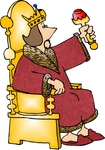Election season is quickly approaching. Unless you live in a distant cave with no cable or wifi, you have been bombarded with advertisements. The American presidential election is one that stirs worldwide attention. As we head to the polls shortly, it is important to understand the impact of our decisions and the ancestors who fought for us to have the opportunity to make these decisions. Two hundred years ago, women of this young country lost their husbands, fathers, brothers, sons, nephews, and cousins as we fought for our independence. We have come a long way since then.
The term “leadership” is a ubiquitous and popular phrase in our country. Colleges run successful leadership degree programs, churches sponsor leadership seminars and courses, and books which chronicle the lives of charismatic leaders rapidly climb the best-seller lists. Why are we so fascinated with leadership?
Because leadership affects our everyday lives.
As soon as we exit the womb, we are inundated with hierarchies. First, we have parents/guardians, then teachers/administrators, and then bosses. We arrive into the surrounding power structures and mature to new ones as we age. Leadership is present in all aspects of our lives.
Historically, leadership was reserved for affluent, powerful, and bold individuals. In the first part of the twentieth century, it was believed that leadership traits were innate (inborn) and therefore could not be taught or practiced. The “Great Man Theory” touted that men were who “tall, dark, and handsome” had some God-given charisma which made them natural leaders. Although physical attractiveness and height do not typically correlate with successful leadership, these were early beliefs of leadership endorsed by culture. Prolific biographer David McCullough even writes in John Adams that Adams was rather short when compared to his political companions, but surely this did not hinder his influence in establishing our country. And need I mention Napoleon?
In today’s culture, leadership is now conceptualized as something more tangible. Anyone who lives a decent life, who gives to others, who shares gifts with the world – these people are genuine leaders. If you are a parent, you are a leader. If you teach or coach, you are a leader. People who place themselves last, they are truly leaders (do you detect the paradox here?). The best leaders are primarily servants. Leadership expert Peter Northouse defines a leader as an individual who exercises influence over a group (2007). This group can be as vast as a country or as small as a local soccer team. Leadership is no longer preserved for corner offices or boardrooms. Leadership takes place all day, all around us. With this, we should embrace our roles as leaders to those in our orbit.
But some people cannot handle the burden of power. C.S. Lewis states that he could not “rule a henhouse, much less a nation” but claimed that people cannot be trusted with power. Absolute power corrupts absolutely, thanks to that dang mistake in the garden. The Fall (or the introduction of sin) promises to perennially create issues for us. I propose two views of power which are ever-present in our culture: the yoke and the cushion.
“The Yoke” illustrates an understanding that power is a weight. Power equals responsibility. A yoke is traditionally worn by the oxen who lead a plow. Therefore, the oxen contribute to the progress of the territory (agricultural, but for the sake of the metaphor also social, political, and economic). Another important aspect to note is the fact that the oxen and the farmer they assist are on the same level horizontally. There is no distinction of status as they work side by side. Power involves hard work and focused energy. The “kingdom” here is not a playground for tyranny, but a field in need of planting and harvesting. The domain needs constant maintenance and thus the yoke is needed to ensure success.
“The Cushion” is for those who view power as a vertical endeavor which will provide some extra perks. There’s a ladder which needs climbing, and each rung places one closer to a goal. In and of themselves, goals are not hazardous; the problem is when the goals sought are for selfish means, not common good. As a graduate of a leadership program, I have heard people say, “Well you have to play the game to accomplish things”. Perhaps, but do we play the game as a means to a better end or so we can benefit ourselves? Someone other than ourselves should benefit from our choices. That is the essence of true leadership. Cushioners step on and over people indifferently in pursuit of what they want. When they arrive at their desired position, there will be a nice, comfy cushion for the bottoms they have worked off to get there. But does leadership ever get easier? We may develop effective strategies which assist us in helping others, but the issues that plague us never evaporate completely. Solutions come then new problems emerge. Those who truly want a better world will never be complacent about the state of human suffering.
Make a mental list of the top five leaders who have influenced you. Do they wear a yoke or sit atop a cushion? Are they intoxicated by power or are they humble servants?
![voter_booth[1]](http://crystalhurd.com/wp-content/uploads/2012/11/voter_booth1.jpg)
On Tuesday, we will go to the poles and determine the next leader for our country. Pray and make your choice, but remember that you have a sphere of influence within arms’ reach. People are hungry for inspiration. Choose to lead with integrity and humility.
![eb495570-4d1a-4974-91c5-5ae69a7b5667-obamaromneymanual[1]](http://crystalhurd.com/wp-content/uploads/2012/11/eb495570-4d1a-4974-91c5-5ae69a7b5667-obamaromneymanual11-300x224.jpg)
![John_Adams_book[1]](http://crystalhurd.com/wp-content/uploads/2012/11/John_Adams_book1.jpg)
![7_bovineplow[1]](http://crystalhurd.com/wp-content/uploads/2012/11/7_bovineplow1.jpg)
